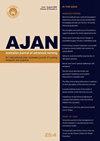Nursing in the time of COVID-19: exploring nurse preparedness early in a global pandemic
IF 1.3
4区 医学
Q3 NURSING
引用次数: 2
Abstract
Objective: To obtain Australian nurses’ perspectives regarding COVID-19 preparedness early in the pandemic. Background: In March 2020 Australia experienced a rise in COVID-19 cases and was bracing itself for the worst, having witnessed China, Europe and America’s earlier exposure to the outbreak. On 14 March 2020 an Australian nurse set up a Facebook page called “Nursing in the time of COVID-19: A clinical forum” allowing colleagues to share information about COVID-19. This presented an ideal opportunity to survey nurses’ preparedness for the pandemic. Study design and methods: Anonymous web-based survey disseminated between 9 April–4 May 2020 via the Facebook page. Results: A total of 214 nurses responded to the survey of whom 85% were direct care clinical staff and 29 (13.5%) had cared for a COVID-19 patient. Prevalent feelings regarding COVID-19 were anxious, overwhelmed, vulnerable, engaged and interested. The strongest sources of information regarding COVID-19 were published academic articles, WHO/ CDC and similar authorities, employer leaflets/ guidance and Facebook. The strongest needs/ expectations identified by the respondents were education and information, access to mental health counselling, provision of additional health workers to support nurses, and supplemental pay rise. Respondents identified work-related training specific to COVID-19, revision of skills and competencies and upskilling to do tasks previously not familiar to the participant of particular benefit. Nurses who had cared for COVID-19 patients expressed a stronger interest in receiving a supplemental pay rise for risk exposure, a stronger sense that they and their employer were ready to care for COVID-19 patients yet expressed less appreciation for mental health counselling compared to nurses who had not yet cared for COVID-19 patients. Discussion: The perspectives of Australian nurses are generally similar to nurses in other countries. However, we report some variations between nurses who have and have not cared for COVID-19 patients. We identify the levels of concern as well as those supportive actions that are most appreciated by nurses responding to COVID-19 specifically, these same findings could be applied to other major events generally. Conclusion: The timing of this survey allowed us to explore the perspectives of Australian nurses during the early pandemic vulnerability period without the benefit of hindsight. Despite thinking the Australian experience was going to be worse than it was, Australian nurses showed relative confidence in their own and their employers’ readiness and this was most obvious in nurses who had cared for COVID-19 patients. What is already known about the topic? Nurses around the world have voiced anxiety and concern about the COVID-19 pandemic and the impact it may have on them personally and professionally. Nurses have access to informal networks, social media, media, employer guidelines and other professional and academic sources of information to stay informed and up-to-date with current information on COVID-19 that may help to allay their concerns. What this paper adds The perspectives of Australian nurses early in the development of the COVID-19 pandemic in relation to how prepared they felt at the time and where they were obtaining information to help guide their thinking and their practice. A synopsis of the role and benefits of a social media platform to allow nurses to share thoughts, articles of interest and experiences of COVID-19. Opinions vary based on whether a nurse had already cared for a COVID-19 patient or not.COVID-19时期的护理:探讨护士在全球大流行中的早期准备
目的:了解澳大利亚护士对新冠肺炎疫情早期准备工作的看法。背景:2020年3月,澳大利亚经历了新冠肺炎病例的上升,并为最坏的情况做好了准备,因为中国、欧洲和美国更早地接触到了疫情。2020年3月14日,一名澳大利亚护士在脸书上建立了一个名为“新冠肺炎时代的护理:临床论坛”的页面,允许同事分享有关新冠肺炎的信息。这为调查护士应对疫情的准备情况提供了一个理想的机会。研究设计和方法:2020年4月9日至5月4日通过Facebook页面发布的匿名网络调查。结果:共有214名护士接受了调查,其中85%是直接护理临床工作人员,29名(13.5%)护理过新冠肺炎患者。对新冠肺炎的普遍感觉是焦虑、不知所措、脆弱、投入和感兴趣。关于新冠肺炎最有力的信息来源是发表的学术文章、世界卫生组织/疾控中心和类似机构、雇主传单/指南和Facebook。受访者确定的最强烈的需求/期望是教育和信息、获得心理健康咨询、提供额外的卫生工作者来支持护士以及补充加薪。受访者确定了新冠肺炎特有的与工作相关的培训、技能和能力的修订以及技能提升,以完成特定利益参与者以前不熟悉的任务。与尚未照顾新冠肺炎患者的护士相比,照顾过新冠肺炎患者的护士表示更有兴趣获得风险暴露的补充加薪,更强烈地感觉到他们和雇主已经准备好照顾新冠肺炎患者,但对心理健康咨询的赞赏程度较低。讨论:澳大利亚护士的观点通常与其他国家的护士相似。然而,我们报告了有和没有照顾新冠肺炎患者的护士之间的一些差异。我们确定了最受新冠肺炎应对护士赞赏的关注程度以及支持性行动。具体而言,这些相同的发现通常可以应用于其他重大事件。结论:这项调查的时间安排使我们能够探索澳大利亚护士在疫情早期脆弱期的观点,而无需事后诸葛亮。尽管澳大利亚护士认为澳大利亚的经历会比过去更糟糕,但他们对自己和雇主的准备情况表现出了相对的信心,这在照顾新冠肺炎患者的护士中最为明显。关于这个话题已经知道了什么?世界各地的护士都对新冠肺炎大流行及其可能对他们个人和职业造成的影响表示焦虑和担忧。护士可以访问非正式网络、社交媒体、媒体、雇主指南以及其他专业和学术信息来源,随时了解新冠肺炎的最新信息,这可能有助于减轻他们的担忧。本文补充了澳大利亚护士在新冠肺炎大流行早期的观点,即他们当时的准备情况,以及他们在哪里获得信息来帮助指导他们的思维和实践。社交媒体平台的作用和好处简介,使护士能够分享新冠肺炎的想法、感兴趣的文章和经历。根据护士是否已经照顾过新冠肺炎患者,不同的想法会有所不同。
本文章由计算机程序翻译,如有差异,请以英文原文为准。
求助全文
约1分钟内获得全文
求助全文
来源期刊
CiteScore
2.30
自引率
7.10%
发文量
27
审稿时长
>12 weeks
期刊介绍:
The Australian Journal of Advanced Nursing publishes a wide variety of original research, review articles, practice guidelines, and commentary relevant to nursing and midwifery practice, health- maternity- and aged- care delivery, public health, healthcare policy and funding, nursing and midwifery education, regulation, management, economics, ethics, and research methodology. Further, the journal publishes personal narratives that convey the art and spirit of nursing and midwifery.
As the official peer-reviewed journal of the ANMF, AJAN is dedicated to publishing and showcasing scholarly material of principal relevance to national nursing and midwifery professional, clinical, research, education, management, and policy audiences. Beyond AJAN’s primarily national focus, manuscripts with regional and international scope are also welcome where their contribution to knowledge and debate on key issues for nursing, midwifery, and healthcare more broadly are significant.

 求助内容:
求助内容: 应助结果提醒方式:
应助结果提醒方式:


